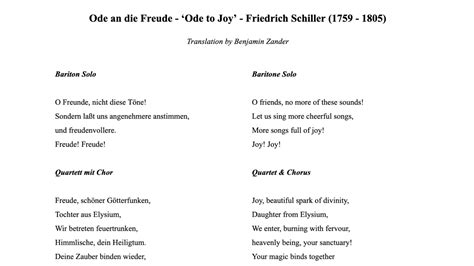ode to joy german - daughter of elysium beethoven : 2024-11-01 ode to joy german"Ode to Joy" is an ode written in the summer of 1785 by German poet, playwright, and historian Friedrich Schiller. It was published the following year in the German magazine Thalia. In 1808, a slightly revised version changed two lines of the first stanza and omitted last stanza. "Ode to Joy" is best known for its use by Ludwig van Beethoven in the final (fourth) movement of his Ninth Symphony, completed in 1824. Beethoven's text is not based entirely on Schiller's poe. ode to joy germanOfficial Rolex site
Official Rolex site. Add to favourites. Explorer II. Oyster, 42 mm, Oystersteel. Reference 226570. View in night mode. Discover in 360°. View variations. Pierce the .
ode to joy germanode to joy german"Ode to Joy" is an ode written in the summer of 1785 by German poet, playwright, and historian Friedrich Schiller. It was published the following year in the German magazine Thalia. In 1808, a slightly revised version changed two lines of the first stanza and omitted last stanza. "Ode to Joy" is best known for its use by Ludwig van Beethoven in the final (fourth) movement of his Ninth Symphony, completed in 1824. Beethoven's text is not based entirely on Schiller's poe.
ode to joy german Discover the German and English text to one of the great anthems of all time, ‘Ode to Joy’ – the triumphant choral climax of Beethoven’s Ninth Symphony. For over 20 years, Beethoven had been .

An die Freude / Ode to Joy by Friedrich Schiller translated by William F. Wertz Freude, schöner Götterfunken, Tochter aus Elysium, Wir betreten feuertrunken, Himmlische, den . Perhaps the most popular modern recording of the hymn can be heard in the 1993 movie, Sister Act 2, sung by Lauren Hill and cast. Learn the German lyrics and English translation of Beethoven’s “Ode .
$2,999.00
ode to joy german